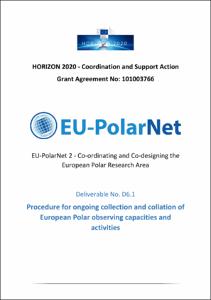| dc.contributor.editor | Larsen, Jan Rene | |
| dc.coverage.spatial | Polar Regions | en_US |
| dc.date.accessioned | 2023-03-03T22:12:29Z | |
| dc.date.available | 2023-03-03T22:12:29Z | |
| dc.date.issued | 2022 | |
| dc.identifier.citation | Larsen, J.R., et al (2022) Procedure for ongoing collection and collation of European Polar observing capacities and activities, WP 6 – European Polar Coordination Office Deliverable No D6.1. Bremerhaven, Germany, EU-PolarNet, 35pp. DOI: http://dx.doi.org/10.25607/OBP-1889 | en_US |
| dc.identifier.uri | https://repository.oceanbestpractices.org/handle/11329/2152 | |
| dc.identifier.uri | http://dx.doi.org/10.25607/OBP-1889 | |
| dc.description.abstract | A diverse and distributed range of existing polar observing facilities and activities could be better utilised to address societally relevant scientific problems. The fundamental challenge related to the utilisation of polar observations is that observing networks and observing systems that produce observations are diverse and distributed of nature. There are many networks of polar observing facilities and activities and portals that organises information about observing facilities and activities, but often they do not share the information. If they do, it is done in a non-consistent way with custom data structures, custom vocabularies, and typically with limited access. There are only a few standards for organising the information within this field.
The hindrances for an efficient organisation of the information are technical as well as political, social, and psychological. This document formulates recommendations that can address these hindrances.
The technical recommendations have focus on federated search, a concept that is already well developed within the polar data management community. Achieving a basic level of technical, syntactical, and semantic interoperability (applying the so-called FAIR principles), would make it easier to aggregate information across sources.
The recommendations to overcome political, social, and psychological hindrances have focus on tools that have worked in the data management world: Data policies should be formulated to also cover organising information about observing facilities and activities, as well as funding and training within them. | en_US |
| dc.description.sponsorship | European Union’s Horizon 2020 research and innovation programme under grant agreement No 101003766 | en_US |
| dc.language.iso | en | en_US |
| dc.publisher | EU-PolarNet 2 Consortium | en_US |
| dc.subject.other | Observing networks | en_US |
| dc.subject.other | eu-Polarnet | |
| dc.title | Procedure for ongoing collection and collation of European Polar observing capacities and activities, WP 6 – European Polar Coordination Office Deliverable No D6.1. | en_US |
| dc.type | Report | en_US |
| dc.description.status | Published | en_US |
| dc.format.pages | 35pp. | en_US |
| dc.description.refereed | Refereed | en_US |
| dc.publisher.place | Brmerhaven, Germany | en_US |
| dc.subject.parameterDiscipline | Cross-discipline | en_US |
| dc.subject.dmProcesses | Data acquisition | en_US |
| dc.description.currentstatus | Current | en_US |
| dc.description.sdg | 14.a | en_US |
| dc.description.maturitylevel | Mature | en_US |
| dc.description.adoption | Validated (tested by third parties) | en_US |
| dc.description.adoption | Multi-organisational | en_US |
| dc.description.adoption | International | en_US |
| dc.description.methodologyType | Method | en_US |
| dc.description.methodologyType | Reports with methodological relevance | en_US |
| obps.contact.contactemail | info@eu-polarnet.eu | |
| obps.resourceurl.publisher | https://eu-polarnet.eu/docs/d6-1-procedure-for-ongoing-collection-and-collation-of-european-polar-observing-capacities-and-activities/ | |
 Repository of community practices in Ocean Research, Applications and Data/Information Management
Repository of community practices in Ocean Research, Applications and Data/Information Management
